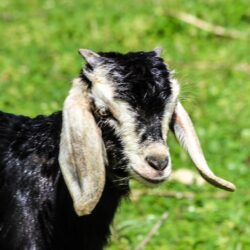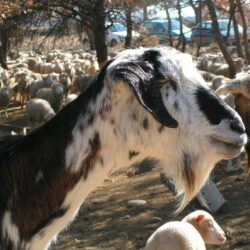| Source (Aramaic) | Translation (Čveneburuli/Georgian) | Translation (Čveneburuli/Judeo-Georgian) | Translation (Čveneburuli/Latin) | Translation (English) |
|---|---|---|---|---|
חַד גַּדְיָא, חַד גַּדְיָא דְּזַבִּן אַבָּא בִּתְרֵי זוּזֵי, חַד גַּדְיָא, חַד גַּדְיָא. |
ერთი თიკანი, ერთი თიკანი რომ იყიდა მამაჩემმა ორ აბაზად, ერთი თიკანი, ერთი თიკანი! |
ארתי תיקהני, ארתי תיקהני, רוֹם יעידה מהמהתשאממה וֹר הבהזהד, ארתי תיקהני, ארתי תיקהני! |
Erti tiḳani, erti tiḳani rom iq̇ida mamačemma or abazad, erti tiḳani, erti tiḳani! |
One little goat, one little goat, that my father bought for two zuzim. One little goat, one little goat. |
וְאָתָא שֻׁנְרָא וְאָכְלָה לְגַדְיָא, דְּזַבִּן אַבָּא בִּתְרֵי זוּזֵי, חַד גַּדְיָא, חַד גַּדְיָא. |
და მოვიდა კატა და შეჭამა თიკანი, რომ იყიდა მამაჩემმა ორ აბაზად, ერთი თიკანი, ერთი თიკანი! |
דה מוֹװידה קהטה דה שאצשהמה תיקהני, רוֹם יעידה מהמהתשאממה וֹר הבהזהד, ארתי תיקהני, ארתי תיקהני! |
Da movida ḳaṭa da šeč̣ama tiḳani, rom iq̇ida mamač̣emma or abazad, erti tiḳani, erti tiḳani! |
A cat came and ate the goat that my father bought for two zuzim. One little goat, one little goat. |
וְאָתָא כַּלְבָּא וְנָשַׁךְ לְשֻׁנְרָא, דְּאָכְלָה לְגַדְיָא, דְּזַבִּן אַבָּא בִּתְרֵי זוּזֵי, חַד גַּדְיָא, חַד גַּדְיָא. |
და მოვიდა ძაღლი და უკბინა კატას, რომ შეჭამა თიკანი, რომ იყიდა მამაჩემმა ორ აბაზად, ერთი თიკანი, ერთი თიკანი! |
דה מוֹװידה דזהגﬞלי דה וּקבינה קהטהס, רוֹם שאצשהמה תיקהני, רוֹם יעידה מהמהתשאממה וֹר הבהזהד, ארתי תיקהני, ארתי תיקהני! |
Da movida ʣaɣli da uḳbina ḳaṭas, rom šeč̣ama tiḳani, rom iq̇ida mamač̣emma or abazad, erti tiḳani, erti tiḳani! |
A dog came and bit the cat that ate the goat that my father bought for two zuzim. One little goat, one little goat. |
וְאָתָא חֻטְרָא וְהִכָּה לְכַלְבָּא, דְּנָשַׁךְ לְשֻׁנְרָא, דְּאָכְלָה לְגַדְיָא, דְּזַבִּן אַבָּא בִּתְרֵי זוּזֵי, חַד גַּדְיָא, חַד גַּדְיָא. |
და მოვიდა ჯოხი და ცემა ძაღლი, რომ უკბინა კატას, რომ შეჭამა თიკანი, რომ იყიდა მამაჩემმა ორ აბაზად, ერთი თიკანი, ერთი თიკანი! |
דה מוֹװידה דשוֹכﬞי דה תסאמה דזהגﬞלי, רוֹם וּקבינה קהטהס, רוֹם שאצשהמה תיקהני, רוֹם יעידה מהמהתשאממה וֹר הבהזהד, ארתי תיקהני, ארתי תיקהני! |
Da movida joxi da cema ʣaɣli, rom uḳbina ḳaṭas, rom šeč̣ama tiḳani, rom iq̇ida mamač̣emma or abazad, erti tiḳani, erti tiḳani! |
A stick came and hit the dog that bit the cat that ate the goat that my father bought for two zuzim. One little goat, one little goat. |
וְאָתָא נוּרָא וְשָׂרַף לְחֻטְרָא, דְּהִכָּה לְכַלְבָּא, דְּנָשַׁךְ לְשֻׁנְרָא, דְּאָכְלָה לְגַדְיָא, דְּזַבִּן אַבָּא בִּתְרֵי זוּזֵי, חַד גַּדְיָא, חַד גַּדְיָא. |
და მოვიდა ცეცხლი და დაწვა ჯოხი, რომ ცემა ძაღლი, რომ უკბინა კატას, რომ შეჭამა თიკანი, რომ იყიდა მამაჩემმა ორ აბაზად, ერთი თიკანი, ერთი თიკანი! |
דה מוֹװידה טסאטסכﬞלי דה דהצװה דשוֹכﬞי דה תסאמה דזהגﬞלי, רוֹם וּקבינה קהטהס, רוֹם שאצשהמה תיקהני, רוֹם יעידה מהמהתשאממה וֹר הבהזהד, ארתי תיקהני, ארתי תיקהני! |
Da movida cecxli da dac̣va joxi, rom cema ʣaɣli, rom uḳbina ḳaṭas, rom šeč̣ama tiḳani, rom iq̇ida mamač̣emma or abazad, erti tiḳani, erti tiḳani! |
A fire came and burned the stick that hit the dog that bit the cat that ate the goat that my father bought for two zuzim. One little goat, one little goat. |
וְאָתָא מַיָּא וְכָבָה לְנוּרָא, דְּשָׂרַף לְחֻטְרָא, דְּהִכָּה לְכַלְבָּא, דְּנָשַׁךְ לְשֻׁנְרָא, דְּאָכְלָה לְגַדְיָא, דְּזַבִּן אַבָּא בִּתְרֵי זוּזֵי, חַד גַּדְיָא, חַד גַּדְיָא. |
და მოვიდა წყალი და ჩააქრო ცეცხლი, რომ დაწვა ჯოხი, რომ ცემა ძაღლი, რომ უკბინა კატას, რომ შეჭამა თიკანი, რომ იყიდა მამაჩემმა ორ აბაზად, ერთი თიკანი, ერთი თიკანი! |
דה מוֹװידה צעהלי דה צשההכּרוֹ טסאטסכﬞלי דה דהצװה דשוֹכﬞי דה תסאמה דזהגﬞלי, רוֹם וּקבינה קהטהס, רוֹם שאצשהמה תיקהני, רוֹם יעידה מהמהתשאממה וֹר הבהזהד, ארתי תיקהני, ארתי תיקהני! |
Da movida c̣q̇ali da č̣aakro cecxli, rom dac̣va joxi, rom cema ʣaɣli, rom uḳbina ḳaṭas, rom šeč̣ama tiḳani, rom iq̇ida mamač̣emma or abazad, erti tiḳani, erti tiḳani! |
Water came and put out the fire that burned the stick that hit the dog that bit the cat that ate the goat that my father bought for two zuzim. One little goat, one little goat. |
וְאָתָא תּוֹרָא וְשָׁתָא לְמַיָּא, דְּכָבָה לְנוּרָא, דְּשָׂרַף לְחֻטְרָא, דְּהִכָּה לְכַלְבָּא, דְּנָשַׁךְ לְשֻׁנְרָא, דְּאָכְלָה לְגַדְיָא, דְּזַבִּן אַבָּא בִּתְרֵי זוּזֵי, חַד גַּדְיָא, חַד גַּדְיָא. |
და მოვიდა ხარი და დალია წყალი, რომ ჩააქრო ცეცხლი, რომ დაწვა ჯოხი, რომ ცემა ძაღლი, რომ უკბინა კატას, რომ შეჭამა თიკანი, რომ იყიდა მამაჩემმა ორ აბაზად, ერთი თიკანი, ერთი თიკანი! |
דה מוֹװידה כﬞהרי דה דהליה צעהלי דה צשההכּרוֹ טסאטסכﬞלי דה דהצװה דשוֹכﬞי דה תסאמה דזהגﬞלי, רוֹם וּקבינה קהטהס, רוֹם שאצשהמה תיקהני, רוֹם יעידה מהמהתשאממה וֹר הבהזהד, ארתי תיקהני, ארתי תיקהני! |
Da movida xari da dalia c̣q̇ali, rom č̣aakro cecxli, rom dac̣va joxi, rom cema ʣaɣli, rom uḳbina ḳaṭas, rom šeč̣ama tiḳani, rom iq̇ida mamač̣emma or abazad, erti tiḳani, erti tiḳani! |
An ox came and drank the water that put out the fire that burned the stick that hit the dog that bit the cat that ate the goat that my father bought for two zuzim. One little goat, one little goat. |
וְאָתָא הַשּׁוֹחֵט וְשָׁחַט לְתוֹרָא, דְּשָׁתָא לְמַיָּא, דְּכָבָה לְנוּרָא, דְּשָׂרַף לְחֻטְרָא, דְּהִכָּה לְכַלְבָּא, דְּנָשַׁךְ לְשֻׁנְרָא, דְּאָכְלָה לְגַדְיָא, דְּזַבִּן אַבָּא בִּתְרֵי זוּזֵי, חַד גַּדְיָא, חַד גַּדְיָא. |
და მოვიდა შოხეტა და დაკლა ხარი, რომ დალია წყალი, რომ ჩააქრო ცეცხლი, რომ დაწვა ჯოხი, რომ ცემა ძაღლი, რომ უკბინა კატას, რომ შეჭამა თიკანი, რომ იყიდა მამაჩემმა ორ აბაზად, ერთი თიკანი, ერთი თიკანი! |
דה מוֹװידה שוֹחֵט׳ה דה דהקלה כﬞהרי דה דהליה צעהלי דה צשההכּרוֹ טסאטסכﬞלי דה דהצװה דשוֹכﬞי דה תסאמה דזהגﬞלי, רוֹם וּקבינה קהטהס, רוֹם שאצשהמה תיקהני, רוֹם יעידה מהמהתשאממה וֹר הבהזהד, ארתי תיקהני, ארתי תיקהני! |
Da movida šoxeṭa da daḳla xari, rom dalia c̣q̇ali, rom č̣aakro cecxli, rom dac̣va joxi, rom cema ʣaɣli, rom uḳbina ḳaṭas, rom šeč̣ama tiḳani, rom iq̇ida mamač̣emma or abazad, erti tiḳani, erti tiḳani! |
A butcher came and slaughtered the ox that drank the water that put out the fire that burned the stick that hit the dog that bit the cat that ate the goat that my father bought for two zuzim. One little goat, one little goat. |
וְאָתָא מַלְאַךְ־הַמָּ֫וֶת וְשָׁחַט לְשׁוֹחֵט, דְּשָׁחַט לְתוֹרָא, דְּשָׁתָא לְמַיָּא, דְּכָבָה לְנוּרָא, דְּשָׂרַף לְחֻטְרָא, דְּהִכָּה לְכַלְבָּא, דְּנָשַׁךְ לְשֻׁנְרָא, דְּאָכְלָה לְגַדְיָא, דְּזַבִּן אַבָּא בִּתְרֵי זוּזֵי, חַד גַּדְיָא, חַד גַּדְיָא. |
და მოვიდა მალახ ამავეთი და დაკლა შოხეტა, რომ დაკლა ხარი, რომ დალია წყალი, რომ ჩააქრო ცეცხლი, რომ დაწვა ჯოხი, რომ ცემა ძაღლი, რომ უკბინა კატას, რომ შეჭამა თიკანი, რომ იყიდა მამაჩემმა ორ აბაზად, ერთი თიკანი, ერთი თიკანი! |
דה מוֹװידה מַלְאָךְ־הַמַּוֶות׳י דה דהקלה שוֹחֵט׳ה דה דהקלה כﬞהרי דה דהליה צעהלי דה צשההכּרוֹ טסאטסכﬞלי דה דהצװה דשוֹכﬞי דה תסאמה דזהגﬞלי, רוֹם וּקבינה קהטהס, רוֹם שאצשהמה תיקהני, רוֹם יעידה מהמהתשאממה וֹר הבהזהד, ארתי תיקהני, ארתי תיקהני! |
Da movida malax amaveti da daḳla šoxeṭa, rom daḳla xari, rom dalia c̣q̇ali, rom č̣aakro cecxli, rom dac̣va joxi, rom cema ʣaɣli, rom uḳbina ḳaṭas, rom šeč̣ama tiḳani, rom iq̇ida mamač̣emma or abazad, erti tiḳani, erti tiḳani! |
The Angel of Death came and slaughtered the shoḥet who slaughtered the ox that drank the water that put out the fire that burned the stick that hit the dog that bit the cat that ate the goat that my father bought for two zuzim. One little goat, one little goat. |
וְאָתָא הַקָּדוֹשׁ־בָּרוּךְ־הוּא וְשָׁחַט לְמַלְאַךְ־הַמָּ֫וֶת דְּשָׁחַט לְשׁוֹחֵט, דְּשָׁחַט לְתוֹרָא, דְּשָׁתָא לְמַיָּא, דְּכָבָה לְנוּרָא, דְּשָׂרַף לְחֻטְרָא, דְּהִכָּה לְכַלְבָּא, דְּנָשַׁךְ לְשֻׁנְרָא, דְּאָכְלָה לְגַדְיָא, דְּזַבִּן אַבָּא בִּתְרֵי זוּזֵי, חַד גַּדְיָא, חַד גַּדְיָא. |
და მობრძანდა აკადოშ ბარუხუ და დაკლა მალახ ამავეთი, რომ დაკლა შოხეტი, რომ დაკლა ხარი, რომ დალია წყალი, რომ ჩააქრო ცეცხლი, რომ დაწვა ჯოხი, რომ ცემა ძაღლი, რომ უკბინა კატას, რომ შეჭამა თიკანი, რომ იყიდა მამაჩემმა ორ აბაზად, ერთი თიკანი, ერთი თიკანი! |
דה מוֹברדזהנדה הַקָּדוֹשׁ־בָּרוּךְ־הוּא דה דהקלה מַלְאָךְ־הַמַּוֶות׳י דה דהקלה שוֹחֵט׳ה דה דהקלה כﬞהרי דה דהליה צעהלי דה צשההכּרוֹ טסאטסכﬞלי דה דהצװה דשוֹכﬞי דה תסאמה דזהגﬞלי, רוֹם וּקבינה קהטהס, רוֹם שאצשהמה תיקהני, רוֹם יעידה מהמהתשאממה וֹר הבהזהד, ארתי תיקהני, ארתי תיקהני! |
Da mobrʣanda aḳadoš baruxu da daḳla malax amaveti, rom daḳla šoxeṭi, rom daḳla xari, rom dalia c̣q̇ali, rom č̣aakro cecxli, rom dac̣va joxi, rom cema ʣaɣli, rom uḳbina ḳaṭas, rom sheč̣ama tiḳani, rom iq̇ida mamač̣emma or abazad, erti tiḳani, erti tiḳani! |
Then the blessed Holy One came and slaughtered the Angel of Death who slaughtered the shoḥet who slaughtered the ox that drank the water that put out the fire that burned the stick that hit the dog that bit the cat that ate the goat that my father bought for two zuzim. One little goat, one little goat. |
The earliest known appearance of “Ḥad Gadya,” by an unknown author, can be found in the Prague Haggadah (1526). The text of the poem is in a form of playful Aramaic and it is accompanied by the lyrics in medieval Yiddish.[1] The Jewish Encyclopedia (1906, NY) vol. 8 page 190 s.v. “Had Gadya” calls it German. It is unclear which, if either, came first — the Yiddish or the Aramaic. The Aramaic above below follows the text as it appears in the Prague Haggadah (1526). The Aramaic has been vocalized according to the Prague Haggadah (1590). Besides the transcription of the Aramaic with its vocalization, I have also added a translation sourced from Eve Levavi Feinstein’s Passover Haggadah translation. –Aharon N. Varady
Recordings
A link to a video of the Georgian text of Ḥad Gadya recorded by the Hebrew Union College Jewish Languages Project can be found here:
Transliteration schema
Click to access Cveneburuli-Judeo-Georgian-transcription-system-by-Isaac-Gantwerk-Mayer-2022.pdf
Notes
| 1 | The Jewish Encyclopedia (1906, NY) vol. 8 page 190 s.v. “Had Gadya” calls it German. |
|---|

“חַד גַּדְיָא | ერთი თიკანი | Erti tiḳani (ארתי תיקהני) — a Čveneburuli translation of Ḥad Gadya by Tamari Lomtadze & Reuven Enoch” is shared through the Open Siddur Project with a Creative Commons Attribution-ShareAlike 4.0 International copyleft license.









Leave a Reply